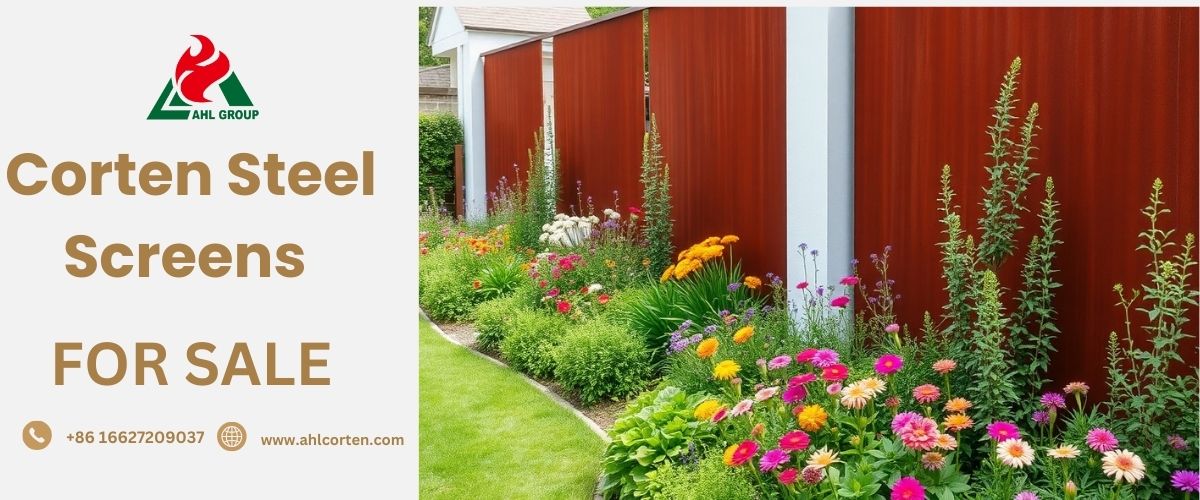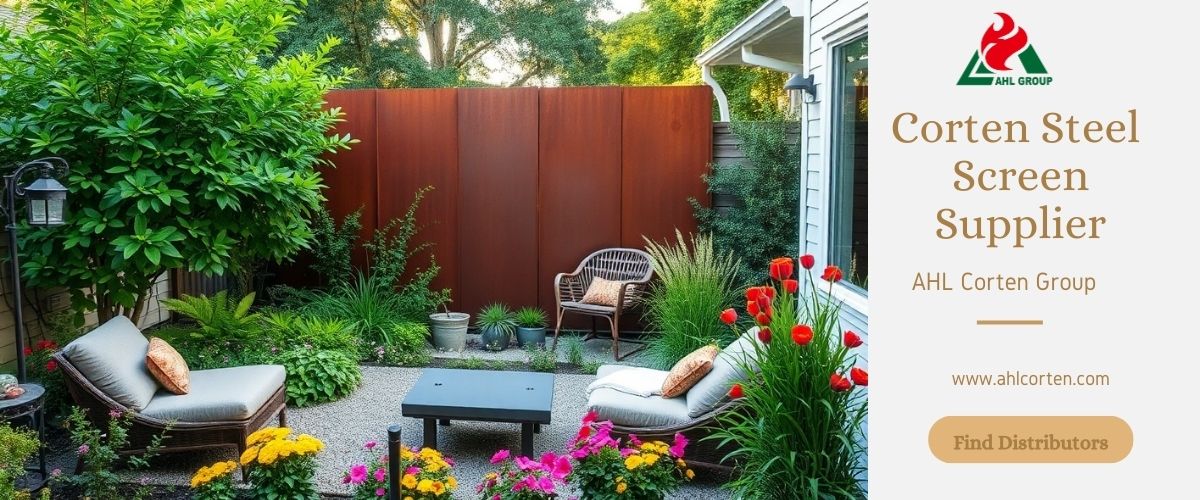Corten Screen Vs. Aluminum Screens: Which Material Is Better
When designing outdoor gardens and patios today, “privacy protection” and “aesthetic enhancement” have become core requirements. Corten steel screens and aluminum screens are currently the two most popular solutions.
However, we've found that 80% of clients face dilemmas during selection: “Will the rust patina on weathering steel peel off?” “Are aluminum screens more low-maintenance?” " Which material offers better long-term value?"
This article aims to help you move beyond the “price-only” mindset. We'll comprehensively compare the pros and cons of both materials, examining practical pain points, long-term value, and style compatibility.
Whether you're a gardening enthusiast seeking natural artistry or a homeowner prioritizing practicality and cost-effectiveness, this guide will help you find the perfect outdoor screen for your needs—avoiding buyer's remorse.

Corten Steel Screen vs Aluminum Screen: Key Differences
1. Aesthetic Style: Is it “Breathing Art” or “Fixed Modernity”?
-
Corten Steel Screens: Each Piece Is a Unique “Work of Time”
Many who encounter weathering steel for the first time worry that “rust” indicates a quality issue—yet this is precisely its core charm.
Our weathering steel screens utilize a proprietary alloy formula that naturally forms a dense, rust-red protective layer when exposed outdoors.
Unlike ordinary steel, this patina won't flake off but will gradually evolve with the seasons and sunlight: Initially a light orange hue, it deepens to rusty red within 1-3 months.
After several years, it develops a warm, matte texture, making the screen appear to “grow” within the garden, naturally harmonizing with greenery and rocks.
More importantly, each piece of weathering steel develops its own unique pace of patina and rust pattern distribution. Even identical designs yield one-of-a-kind results, eliminating any worry of “clashing” with your neighbor's choice.
-
Aluminum Screens: Fixed Colors, But Lacking “Vitality”
Aluminum screens excel in “color control.” Through powder coating, they can achieve pure hues like white, gray, or black—even matching your home's exterior—making them ideal for minimalist, modern spaces.
However, the drawbacks are evident: once the coating cures, the color remains fixed. Over time, they can appear increasingly “stiff” and unchanging. Furthermore, if the coating is scratched by a hard object, exposing the underlying silver aluminum, it becomes highly noticeable and detracts from the overall aesthetic.
2. Maintenance Costs: “Buy and Forget” or “Annual Touch-ups”?
-
Rusted Steel Screens: The True “Zero-Maintenance” Choice
This is where weathering steel truly excels in hassle-free ownership. Our screens undergo pre-treatment before leaving the factory, requiring zero maintenance post-installation: no rust-proof paint, no protective coatings. Even under torrential rain, blizzards, or intense UV exposure, the surface rust layer self-repairs to halt further oxidation of the underlying steel. Occasional rinsing with clean water to remove dust is all that's needed to maintain its aesthetic appeal.
Many long-term customers report that their weathering steel screens have lasted over five years with no deformation or damage—only a richer patina. The time and money saved on maintenance far outweighs the initial price difference.
-
Aluminum Screens: Seemingly Hassle-Free, But “Hidden Costs” Lurk
Aluminum screens won't rust, but their coating is their Achilles' heel. Under strong outdoor UV exposure, the coating tends to fade and become brittle within 3-5 years. If exposed to hail or scratches from branches, the coating may develop marks.
Once rainwater seeps through, the underlying aluminum may oxidize and turn black. At this point, you'll need to sand it down and reapply the coating, not only incurring material costs but also hiring labor for the job. When you tally it up, the annual maintenance costs aren't low.
.jpg)
3. Durability: Will It Last Decades Without Replacement, or Require Repairs Within Years?
-
Weathering Steel Screens: Rugged, Stable, and Unfazed by Extreme Weather
Our corten steel fence panels feature a thickness of 2-3mm, offering far superior load-bearing capacity and impact resistance compared to aluminum screens: They won't sway in strong winds, nor deform from accidental bumps by children; they withstand humid southern monsoons and northern freeze-thaw cycles without structural compromise. Testing confirms over 30 years of service life in standard outdoor conditions—a true “once-in-a-lifetime investment.”
-
Aluminum Screens: Lightweight but Not Durable
Aluminum has only one-third the density of steel, making aluminum screens lightweight and easy to install. However, this also means they lack robustness: strong winds require additional anchoring stakes to prevent tipping; impacts from heavy objects easily cause dents that cannot be repaired, necessitating full replacement. Typically, aluminum screens have an average lifespan of 8-12 years, after which they require frequent repairs or outright replacement.
4. Cost Comparison: Cheaper Upfront or More Cost-Effective Long-Term?
-
Weathering steel screens: Higher upfront cost, but more economical long-term
Objectively, metal privacy screens cost 20%-30% more than aluminum ones initially. However, considering the long-term picture, weathering steel proves more cost-effective:
Assuming an outdoor screen lasts 10 years:
- Weathering steel: One-time payment, zero maintenance costs, remains fully functional after 10 years;
- Aluminum screen: Cheaper upfront, but requires recoating every 5 years (costing about 1/4 of the original price). May need replacement after 10 years, resulting in higher total costs than weathering steel.
Additionally, corten steel screen holds its value better. Even if you renovate your garden later, the old screen can be repurposed into a trellis or planter, ensuring zero waste.
-
Aluminum screens: Initial savings, but numerous long-term “hidden costs”
If your budget is extremely limited and you only plan for short-term use (e.g., rented homes, temporary garden makeovers), aluminum screens can serve as a transitional option. But be prepared: the costs of later maintenance and replacement will gradually “offset” the initial price difference. The longer you use them, the more likely you'll feel they're “not worth it.”

Corten Screen vs. Aluminum Screen Core Parameter Comparison
| Dimensions |
Corten Steel Screen |
Aluminum Screen |
| Style |
Unique rust finish, natural & vintage |
Fixed color, modern & common |
| Maintenance |
No maintenance, just rinse |
Needs recoating every 3–5 years |
| Durability |
30+ years, strong & weatherproof |
8–12 years, dents easily |
| Installation |
Heavy, stable |
Light needs reinforcement |
| Cost |
Higher upfront, no extra cost later |
Lower upfront, more costs over time |
| Eco & Safety |
Non-toxic, soil-friendly |
The coating may release harmful substances |
The Top 3 Questions Customers Ask About Screens
1. Will Rust Water From Corten Screen Stain the Floor or Damage Plants?
Absolutely not. During the initial 1-3 months after installation, our weathering steel screens undergo an “initial weathering phase” where a small amount of light rust-colored water may drip. Simply lay a 5cm-thick layer of gravel at the base of the screen (or install a drainage channel) to catch the rust water, preventing it from seeping into the soil. After 3 months, the rust layer stabilizes and no further dripping occurs.
Moreover, the rust layer on weathering steel is stable iron oxide, free of heavy metals. Even minimal soil contact won't affect plant growth—many clients use weathering steel for vegetable bed frames, and the harvested produce is completely safe.
2. Can I Customize My Own Screen Pattern?
Absolutely! Our professional laser cutting team can precisely etch any design onto the weathering steel—whether geometric patterns, botanical motifs (like vines or maple leaves), or your own logos and text. One client had their family's Chinese zodiac signs cut into openwork patterns. After installation, sunlight filtering through the designs casts stunning light and shadow effects on the ground—something aluminum screens struggle to achieve.
The customization process is straightforward: you provide drawings or describe your needs, our designers create 3D renderings for confirmation, and production begins only after approval—no worries about receiving something different from what you ordered.
3. Can I remove and reinstall the Screen If It Is Not In The Right Position After Installation?
Though heavy, corten steel fence panels offer flexible installation. Our modular design features removable floor anchors, allowing easy relocation without damage. However, we recommend planning placement beforehand, as minimal rust may form on the base where it contacts the floor. Simply wipe it clean during reinstallation—it won't affect functionality.
Which Garden Screen is Right for You?
Our metal privacy screen fence is the perfect choice if you:
- Seek a unique, natural artistic touch for your garden and want to avoid common designs.
- Prefer low-maintenance solutions—buy it and forget it—for long-term cost savings;
- Plan to stay long-term and want a screen that “grows” with your garden.
If you're looking for short-term use, have a limited budget, and prefer solid colors, aluminum screens can be an alternative—but be sure to factor in future maintenance costs.
.jpg)
Create a One-of-a-Kind Weathering Steel Landscape in Your Garden
Now, you no longer need to agonize over “weathering steel or aluminum”—click [Corten Steel Screen Fencing] to explore over 100 real-life weathering steel screen installations. From minimalist openwork designs to intricate custom pieces, there’s a style to match your garden’s character. Alternatively, contact our customer service directly with your garden dimensions and design requirements for a complimentary proposal and quote.
A metal screen isn't a “disposable decoration”—it's a garden companion that will last you decades. Choosing it means gaining not just a screen, but an outdoor space that grows more beautiful with time.
Back

.jpg)

.jpg)